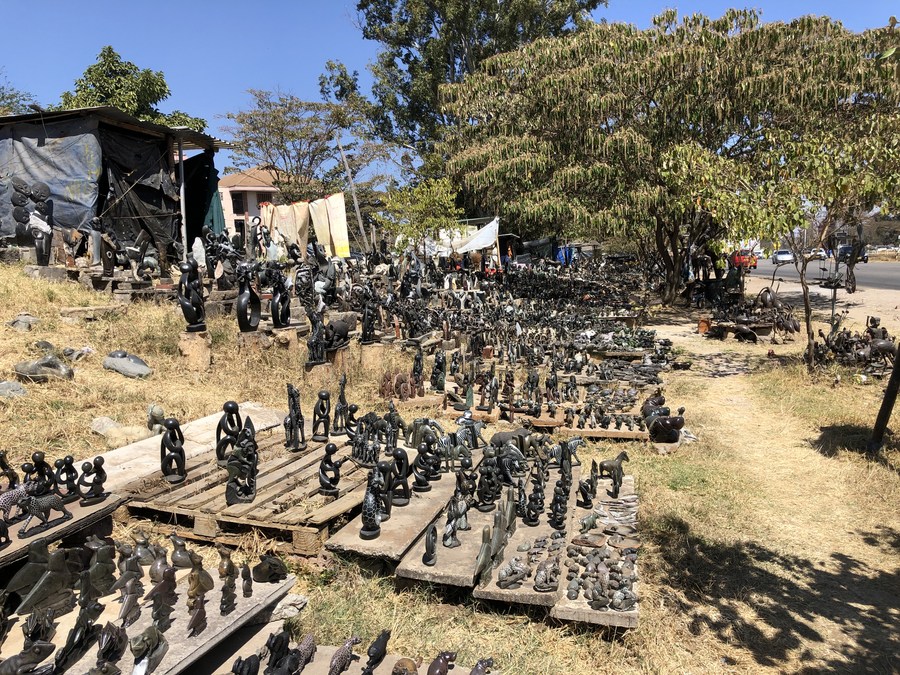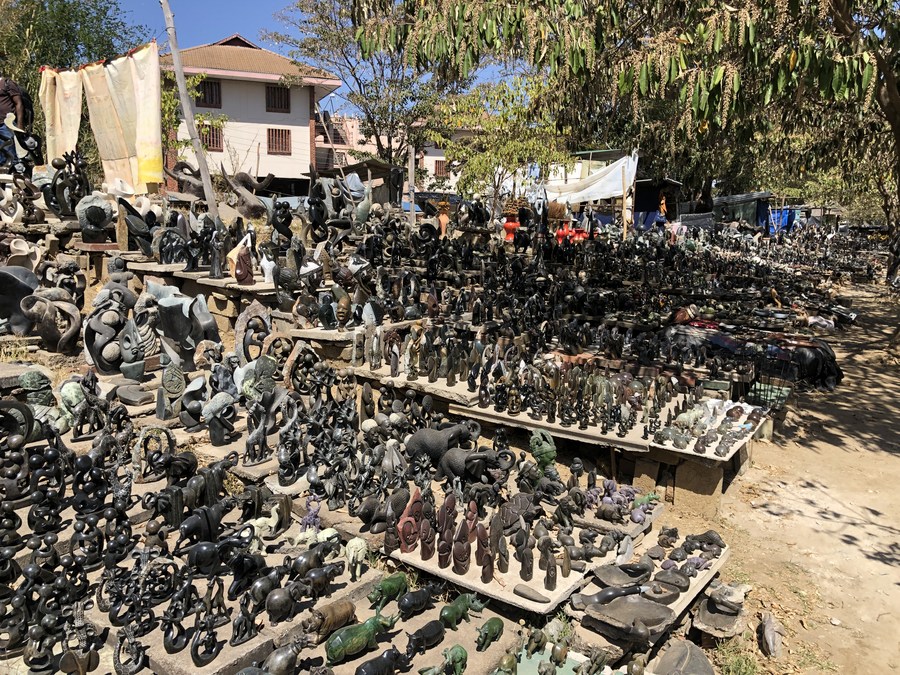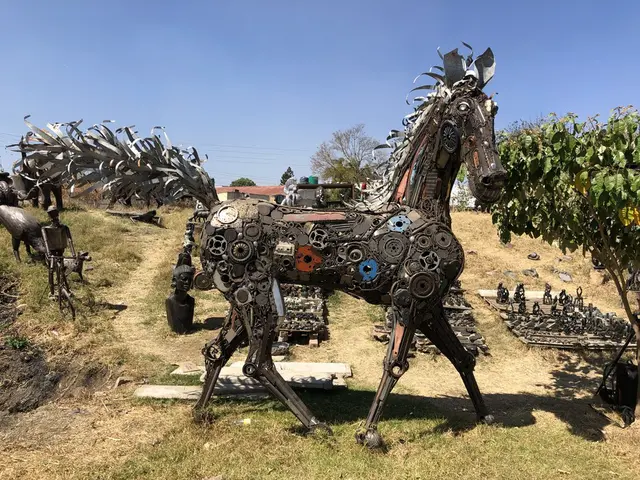With flights grounded and non-essential businesses shut amid COVID-19 pandemic, Zimbabwe's art industry which is highly dependent on tourists spending has been devastated. The country's tourism sector could lose up to 1.1 billion U.S. dollars due to COVID-19 travel restrictions.
by Tafara Mugwara
HARARE, Aug. 16 (Xinhua) -- With flights grounded and non-essential businesses shut amid COVID-19, Zimbabwe's art industry which is highly dependent on tourists spending has been devastated.
The COVID-19 pandemic stopped all tourist arrivals in Zimbabwe since the end of March when the southern African country imposed a ban on nearly all incoming passenger flights.
In the capital Harare, the once bustling Newlands Arts and Craft Market sits nearly empty as the pandemic keep tourists who used to frequent the market confined to their home countries.
Now sculptures and other artworks on display are gathering dust as most of those who had placed orders before the pandemic have not been able to come forward to take delivery for their pieces due to the COVID-19 induced lockdown.
With virus cases spiking locally and abroad, artists and traders at the market have been left with little hope of finding customers.
Gift Rusere, a 35-year-old sculptor who has been in the industry for 20 years, said the arts and craft sector has been severely rocked by the COVID-19 shutdown.
A horse made up of scrap metal is seen displayed at an arts and craft market in Harare, Zimbabwe, August 13, 2020. (Xinhua/Tafara Mugwara)
"This has greatly affected my work considering the fact that I am an exporter. I ship some of my work to countries such as Australia, America, Germany and also England," he told Xinhua.
Rusere and other artists at the Newlands market have now found themselves without commercial outlets for their work, as many galleries, art fairs and festivals locally and abroad have shut down.
"For the better part of this year I haven't exported anything to those countries. Business is shut down there because the galleries are not open, so there isn't any business because there are no tourists that have been coming into the country.
"During the normal times we normally have some festivals and art fairs, but all of those have been cancelled for the better part of this year, so there is nothing that is going to be taking place this year because of this pandemic and we are actually struggling to make ends meet," said Rusere.
"We used to get many Chinese that came in large numbers for different purposes, and they would visit us here, they would buy from us," he said.
Another artist, Adam Moore, said the pandemic has been a disaster for the arts industry.
"You can see from the movement of people, there is no business to talk about," he said.
Foreign consumers also account for the bulk of Moore's clientele but travel restrictions around the world are curtailing the normal flow of tourists who usually buy his pieces.

Stone sculptures and metal artwork are displayed at an arts and craft market in Harare, Zimbabwe, August 13, 2020. (Xinhua/Tafara Mugwara)
An economic fallout from the virus has also seen wealth locals who are potential substitutes to foreign tourists keeping a tight grip on their purses and wallets.
"With this lockdown, people cannot move, there is no money in circulation," he added.
Moore said lost revenue is still piling up due to cancellations of art exhibitions.
Dorothy Mhondamapango, who has been in the arts and craft industry for the past 27 years, said the pandemic has taken a huge financial toll on her business.
"We are just coming to work because that's what we used to do, but business has tanked because no foreigners are coming to buy," she said.
Mhondamapango has also seen knock-on effects from the broader economic downturn.
"Locals buy here and there, we are all struggling to survive, many people are not going to work, so we don't expect much support from local consumers," she said.
Zimbabwe's crippling economic challenges means very few local people can afford to spend money on luxury consumer goods such as artworks.
Jane Manhamo who sells stone sculptures, wooden crafts and African print clothing said it had been difficult after normal operations stopped.
Manhamo said the coronavirus restrictions have seen a dramatic decline in business.

Stone sculptures and metal artwork are seen displayed at an arts and craft market in Harare, Zimbabwe, August 13, 2020. (Xinhua/Tafara Mugwara)
Zimbabwe has a rich history of stone sculpture. Works by some of the country's renowned artists has been exhibited around the world and great acclaim has accrued to contemporary artists.
The country's famous stone sculpture industry attracts a fair share of foreign visitors every year, contributing immensely to the tourism sector.
About 1.2 million tourists visited Zimbabwe in 2019, drawn by its unparalleled wildlife and rich historical and natural sites.
The country received a total of 1.25 billion U.S. dollars in tourism receipts in the same year, with foreign receipts contributing some 868 million U.S. dollars.
Zimbabwe's Environment, Climate, Tourism and Hospitality Industry Minister Mangaliso Ndlovu recently said the country's tourism sector could lose up to 1.1 billion U.S. dollars due to COVID-19 travel restrictions.
 简体中文
简体中文

